Who Is Eddie Huang and Why He Changed Food Culture Forever
Eddie Huang is a multi-talented chef, author, and TV personality who became famous for his memoir “Fresh Off the Boat” and the ABC sitcom it inspired. Born March 1, 1982, Huang is an American restaurateur who opened the iconic Taiwanese bao shop BaoHaus in New York’s East Village, wrote bestselling books, and created groundbreaking television content that changed how Asian-American stories are told.
Quick Facts About Eddie Huang:
- Chef & Restaurateur: Founded BaoHaus (2009-2020), specializing in Taiwanese gua bao
- Author: Wrote memoir “Fresh Off the Boat” (2013) and “Double Cup Love” (2016)
- TV Creator: His memoir became ABC’s first Asian-American family sitcom (2015-2020)
- Director: Made his film debut with “Boogie” (2021)
- Background: Former corporate attorney turned food entrepreneur
- Cultural Impact: Pioneered hip-hop influenced Asian fusion cuisine
Huang’s journey from corporate lawyer to cultural icon started when he was laid off during the 2007-08 financial crisis. Instead of finding another law job, he pivoted to stand-up comedy and eventually opened BaoHaus, serving Taiwanese steamed buns with American twists.
His outspoken personality and unique blend of Asian heritage with hip-hop culture made him a polarizing but influential voice in food media. Through shows like “Huang’s World” on Vice and his restaurant ventures, he’s pushed conversations about authentic representation and cultural identity in ways that resonate with food lovers seeking genuine culinary experiences.
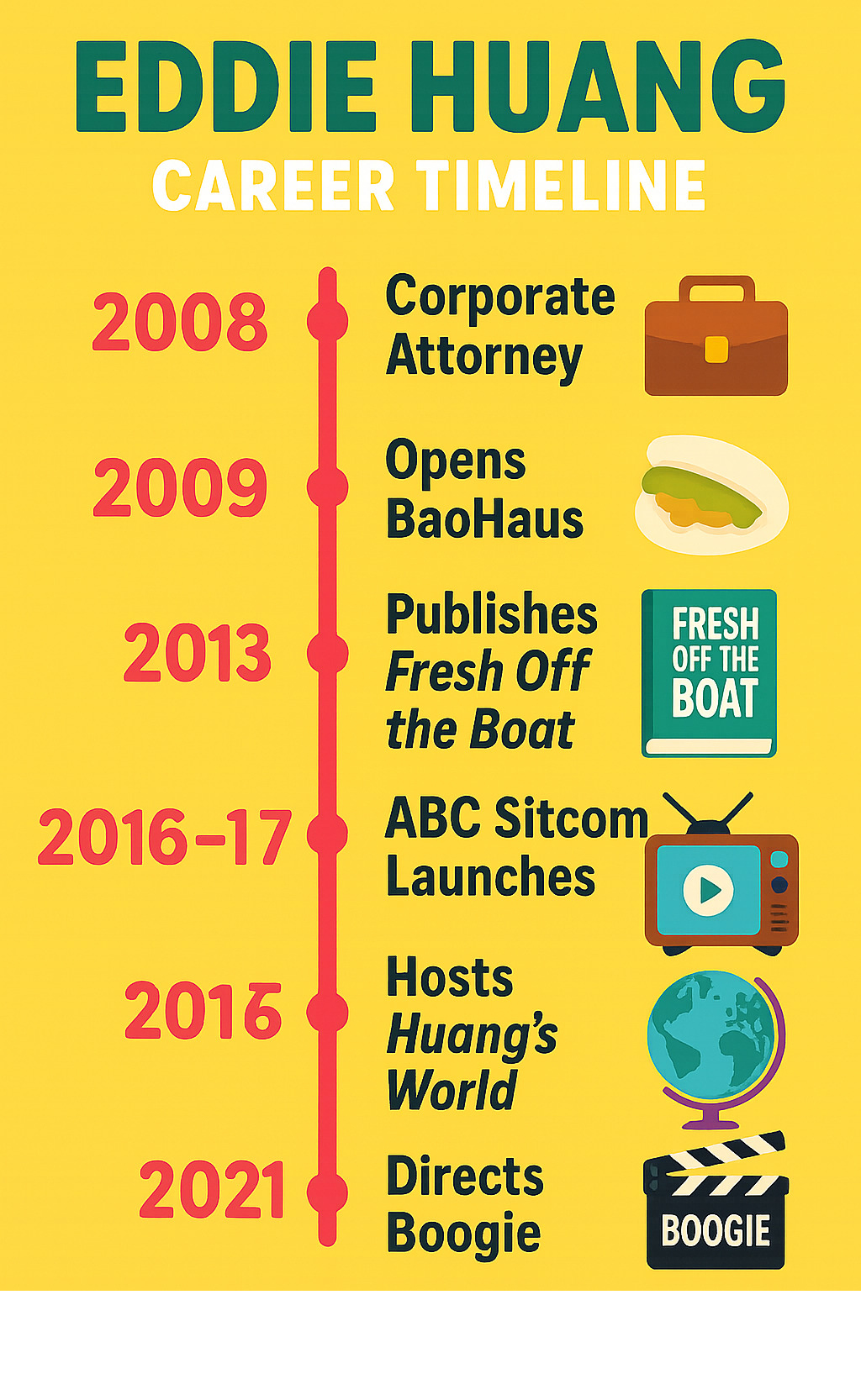
Quick eddie huang definitions:
Eddie Huang: From Orlando Kid to Cultural Icon
Eddie Huang’s journey from a scrappy kid in Orlando to a cultural powerhouse perfectly captures the modern Asian-American experience. Born Edwyn Charles Huang on March 1, 1982, in Washington, D.C., he grew up in a household where Louis and Jessica Huang worked tirelessly to build their version of the American dream.
The Huang family’s immigration story mirrors that of countless families seeking opportunity in America. Eddie’s parents brought their Chinatown roots with them, maintaining cultural traditions while pushing their kids to succeed. This balancing act between old and new would become a defining theme in Eddie’s life and work.
Growing up with his brothers Emery and Evan, Eddie learned the restaurant business early. His father owned successful restaurants, where young Eddie worked as an expediter – managing kitchen communication and absorbing cooking techniques. These formative experiences would later prove invaluable when he launched his own culinary ventures.
But Eddie wasn’t your typical restaurant kid. He frequently got into fights and was arrested at least twice on assault charges. This rebellious streak reflected the struggles many immigrant children face when trying to steer between their family’s expectations and fitting into American society.
Real-Life Background vs. Sitcom Origins
The Eddie Huang portrayed on ABC’s “Fresh Off the Boat” tells a sanitized version of his real story. While the sitcom shows a family moving from Washington D.C.’s Chinatown to Orlando, Florida, with young Eddie (played by Hudson Yang) dealing with typical coming-of-age challenges, the reality was much grittier.
The television adaptation focuses on family-friendly comedy that works for network TV. But Eddie’s original memoir contained raw content about racism, identity struggles, and cultural conflicts that didn’t make it to the small screen. The show’s Chungi Yi Ming character development took creative liberties that frustrated the real Eddie.
Eddie Huang has been openly critical of how his story was adapted, feeling the sitcom missed the authentic edge of his experiences. The TV version presents a more polished family dynamic, while his memoir revealed the messy, complicated reality of being Asian-American in predominantly white spaces.
Core Personality Traits & Passions
What makes Eddie Huang fascinating is his unapologetic blend of influences. He’s described himself as “the black sheep in my family” – someone who found his identity through hip-hop culture and street authenticity rather than traditional academic success.
His food obsession started early, but it was always mixed with entrepreneurial hustle. He once sold bootleg CDs for $5 each and convinced his parents to buy Lunchables because that’s what “white people” ate for lunch. This hustler mentality would later drive his success in both the restaurant world and media.
Hip-hop became Eddie’s cultural anchor. His love for gangsta rap and African-American culture shaped his worldview and influenced his approach to food, business, and storytelling. This wasn’t just teenage rebellion – it was his way of finding authenticity in a world where he often felt like an outsider.
The combination of his legal training, street smarts, and deep understanding of both Asian and American cultures created a unique voice in food media. His rebellious streak never disappeared – it just evolved into a platform for challenging how Asian-Americans are represented in popular culture.
Culinary Rise – BaoHaus and Beyond
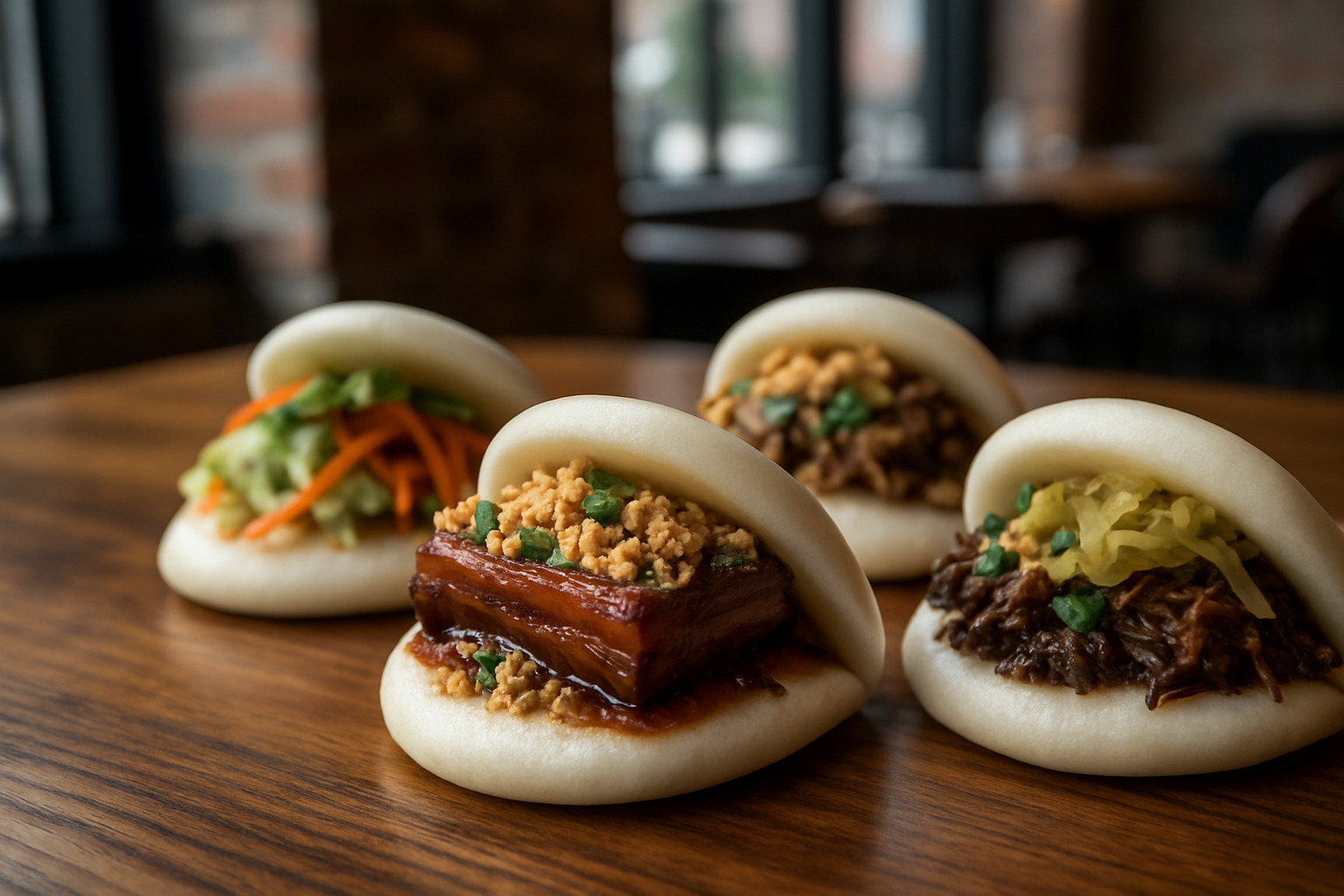
Sometimes the best opportunities come disguised as disasters. When Eddie Huang got laid off from his corporate law job during the 2007-08 financial crisis, he could have scrambled to find another legal position. Instead, he decided to follow his passion for food.
In December 2009, Huang opened BaoHaus in New York’s East Village, bringing authentic Taiwanese street food to American diners. His specialty was gua bao – pillowy steamed buns stuffed with braised pork belly, pickled vegetables, and crushed peanuts. These weren’t your typical Chinese takeout offerings. They were bold, authentic, and served with Huang’s signature attitude.
The restaurant became an instant sensation, drawing lines of curious food lovers eager to try these Taiwanese treasures. What made BaoHaus special wasn’t just the food – it was Eddie Huang’s personality infused into every aspect of the experience. Hip-hop music bumped in the background while customers bit into traditional buns that somehow felt completely modern.
Running BaoHaus taught Huang harsh lessons about the restaurant business. The margins were razor-thin, the work was exhausting, and success came with its own challenges. The restaurant relocated in July 2011 to handle growing demand, but like many beloved food spots, it eventually closed permanently in October 2020.
While BaoHaus was making waves in New York, Huang expanded his influence through television. He hosted shows like “Cheap Bites” and “Unique Eats,” but his travel series “Huang’s World” on Vice really showcased his talents. The show earned an impressive 8.1 rating and proved that food television could be both entertaining and culturally meaningful.
Chef-Led Entrepreneurship
Eddie Huang never saw himself as just a restaurant owner – he was a cultural ambassador serving food with a message. Every gua bao that left his kitchen was a statement about Asian-American identity and a challenge to people’s assumptions about what Asian cuisine could be.
His entrepreneurial spirit extended beyond the restaurant walls. Huang founded Hoodman Clothing, a streetwear label that collaborated with graphic designers in Taiwan. This wasn’t just about making money – it was about creating connections between his heritage and his adopted home.
The closure of BaoHaus in 2020 marked the end of an era, but it wasn’t the end of Huang’s creative journey. According to IMDb, he has several projects in development, including films titled “Panda” and “Tuna Melt.” His evolution from chef to filmmaker shows how food can be a stepping stone to broader cultural conversations.
Influence on Food Tourism & Pop Culture
Eddie Huang didn’t just introduce Americans to Taiwanese street food – he created an entirely new way of thinking about Asian cuisine in America. His success with gua bao helped spark the broader street food boom that transformed urban dining scenes across the country.
By blending hip-hop culture with traditional Asian flavors, Huang pioneered what we might call hip-hop gastronomy – food that reflects multicultural influences and speaks to diverse audiences. This wasn’t fusion for fusion’s sake; it was authentic expression of his lived experience.
His influence extends to modern food tourism, where travelers seek experiences that tell stories and challenge their perspectives. For food enthusiasts interested in chef-led experiences, Huang’s model demonstrates how personal storytelling and cultural authenticity can create memorable dining experiences that go far beyond just satisfying hunger.
Eddie Huang on ‘Fresh Off the Boat’ – Fact vs. Fiction
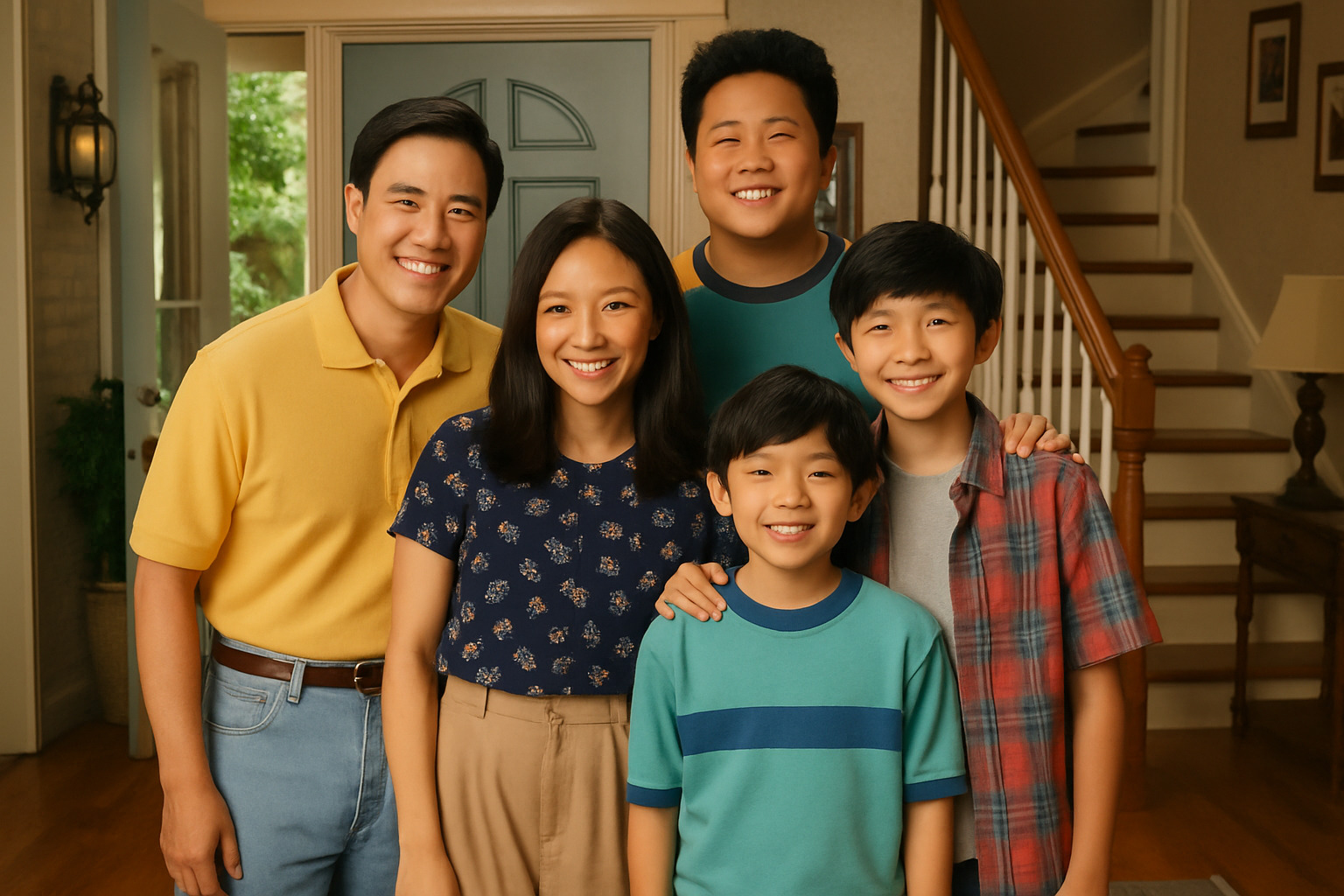
When Eddie Huang’s memoir became ABC’s “Fresh Off the Boat,” something got lost in translation. The sitcom ran for six successful seasons from 2015 to 2020, bringing Asian-American stories to mainstream television for the first time. But the show that aired wasn’t quite the story Huang originally told.
The television version follows the Huang family’s move from Washington D.C.’s Chinatown to Orlando, Florida, where dad Louis opens Cattleman’s Ranch Steakhouse. While this mirrors the real family’s journey, the sitcom softened many of Huang’s raw experiences into family-friendly comedy suitable for network TV.
Hudson Yang’s portrayal of young Eddie captures the hip-hop obsession and cultural struggles, but with a lighter touch than the memoir’s grittier reality. The show earned a solid 7.8 rating across 116 episodes, proving audiences were hungry for these stories – even in their sanitized form.
The real Eddie Huang has been vocal about his mixed feelings toward the adaptation. He felt the show moved too far from his original vision, trading authenticity for broader appeal. It’s the classic tension between staying true to your story and making it accessible to mainstream audiences.
Major Storylines & Character Arcs
The sitcom Eddie steers typical teenage challenges with a cultural twist. His crush on classmate Nicole and later relationship with Alison show how identity affects young romance. His constant battles with perfectionist mother Jessica over SAT scores and college dreams ring true for many Asian-American families.
What makes the show compelling is Eddie’s connection to Allen Iverson and 90s hip-hop culture. These aren’t just teenage interests – they represent his search for identity in a predominantly white Orlando suburb. The show captures his outsider status through moments like eating Chinese noodles with the school janitor or his failed attempts to fit in with classmates.
The series showcases Eddie’s entrepreneurial spirit through various schemes. He convinces his parents that Lunchables are “white people lunch” and sells bootleg CDs for five dollars each. These storylines reflect the real Huang’s hustler mentality, even if they’re presented with sitcom charm rather than street-level grit.
His identity search drives many episodes as he tries balancing his family’s expectations with his own interests. The show explores how cultural assimilation affects family dynamics, especially when kids adapt faster than their parents.
Friends, Family & Love Interests on Screen
The heart of “Fresh Off the Boat” lies in Eddie’s relationships. His friendships with Trent, Dave, and Walter show how he builds connections despite feeling different from his classmates. These relationships evolve from surface-level interactions to genuine friendships that accept his unique perspective.
Family dynamics provide the show’s emotional core. Eddie’s relationship with grandma Jenny adds cultural depth, while his interactions with brothers Emery and Evan show different approaches to assimilation. His ongoing clashes with Jessica create comedy but also highlight real generational and cultural tensions.
The show handles Eddie’s romantic storylines with care, showing how cultural identity affects personal relationships during formative years. His crushes and relationships demonstrate the complexity of growing up between two cultures, where even dating involves navigating different expectations and values.
Through six seasons, these evolving relationships created a portrait of Asian-American family life that resonated with audiences seeking authentic representation, even if the real Eddie Huang wished it had stayed closer to his original, unvarnished story.
Identity, Hip-Hop & Representation
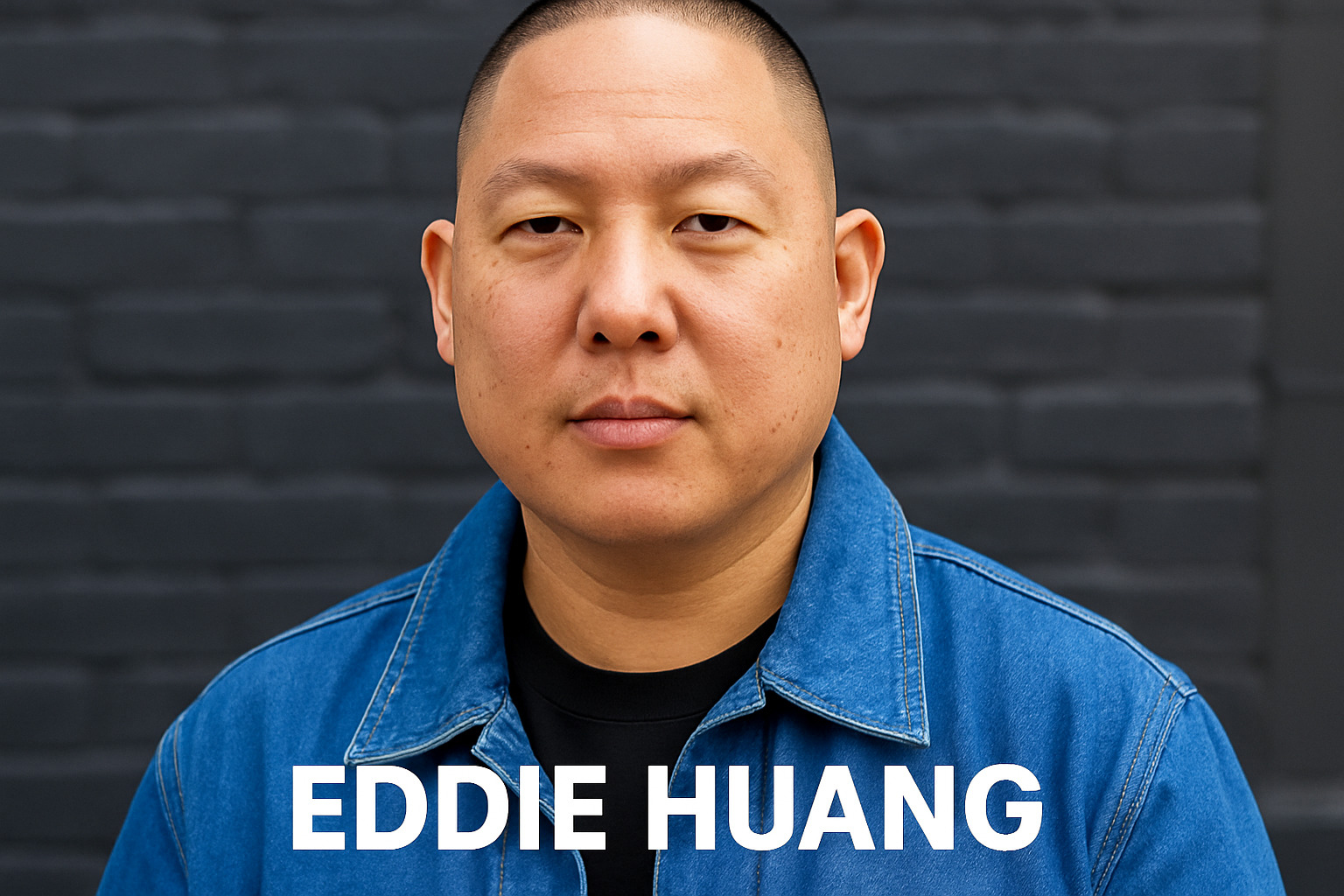
Hip-hop wasn’t just music for Eddie Huang – it became his lifeline. Growing up as an Asian-American kid who didn’t fit traditional molds, he found his identity in 90s rap culture and the voices of artists who spoke about being outsiders.
“If you were an outsider, hip-hop was your anthem. And I was definitely the black sheep in my family,” Huang has said. This connection went beyond just listening to music. He acceptd the culture’s emphasis on authenticity, self-expression, and speaking truth to power – values that would later shape everything from his restaurant concept to his approach to storytelling.
His deep identification with African-American culture sometimes put him in controversial territory. Huang has made comparisons between how Asian men and black women are portrayed in American media, arguing that both groups face systematic emasculation. While these comments sparked important conversations about intersectionality and representation, they also drew criticism.
The influence of hip-hop culture shows up clearly in how Eddie Huang approached food. Instead of watering down Taiwanese flavors to appeal to mainstream American tastes, he kept his gua bao bold and authentic – just like his favorite rappers kept their lyrics real even when it limited radio play.
Impact on Asian-American Visibility
When “Fresh Off the Boat” premiered in 2015, it broke new ground as the first Asian-American family sitcom on network television in over two decades. For many Asian-American families, seeing themselves represented on mainstream TV was emotionally powerful.
But Eddie Huang wasn’t entirely happy with the result. He’s been vocal about the “bamboo ceiling” that limits Asian-American advancement in entertainment and other industries. His memoir commentary and public statements have pushed important conversations about whether authentic representation can survive the Hollywood machine.
The tension between authenticity and commercial appeal became a central theme in Huang’s career. His 2021 directorial debut “Boogie” represents his attempt to tell Asian-American stories with the complexity he felt was missing from his sitcom adaptation. The film explores basketball culture, minority identity, and domestic abuse – topics that don’t usually make it into family-friendly TV shows.
Through his various platforms, Huang has contributed to broader media diversity conversations that go beyond just having Asian faces on screen. He’s pushed for stories that show the full humanity of Asian-American experiences, including the messy, complicated parts that don’t fit neat stereotypes.
Controversies & Public Voice
Eddie Huang’s willingness to speak his mind has generated plenty of heated discussions over the years. His Twitter presence and interviews often challenge conventional thinking about race, culture, and what it means to be authentically American.
Some of his most controversial moments came from comments about gender dynamics and cultural appropriation. Critics have accused him of misogyny and insensitivity, while supporters argue he’s raising difficult but necessary questions about how different minority groups experience discrimination.
These controversies highlight the challenges facing any public figure who tries to have honest conversations about complex cultural issues. His outspoken activism continues to influence how we think about cultural authenticity in food media and beyond.
Fun Facts, Trivia & FAQs about Eddie Huang
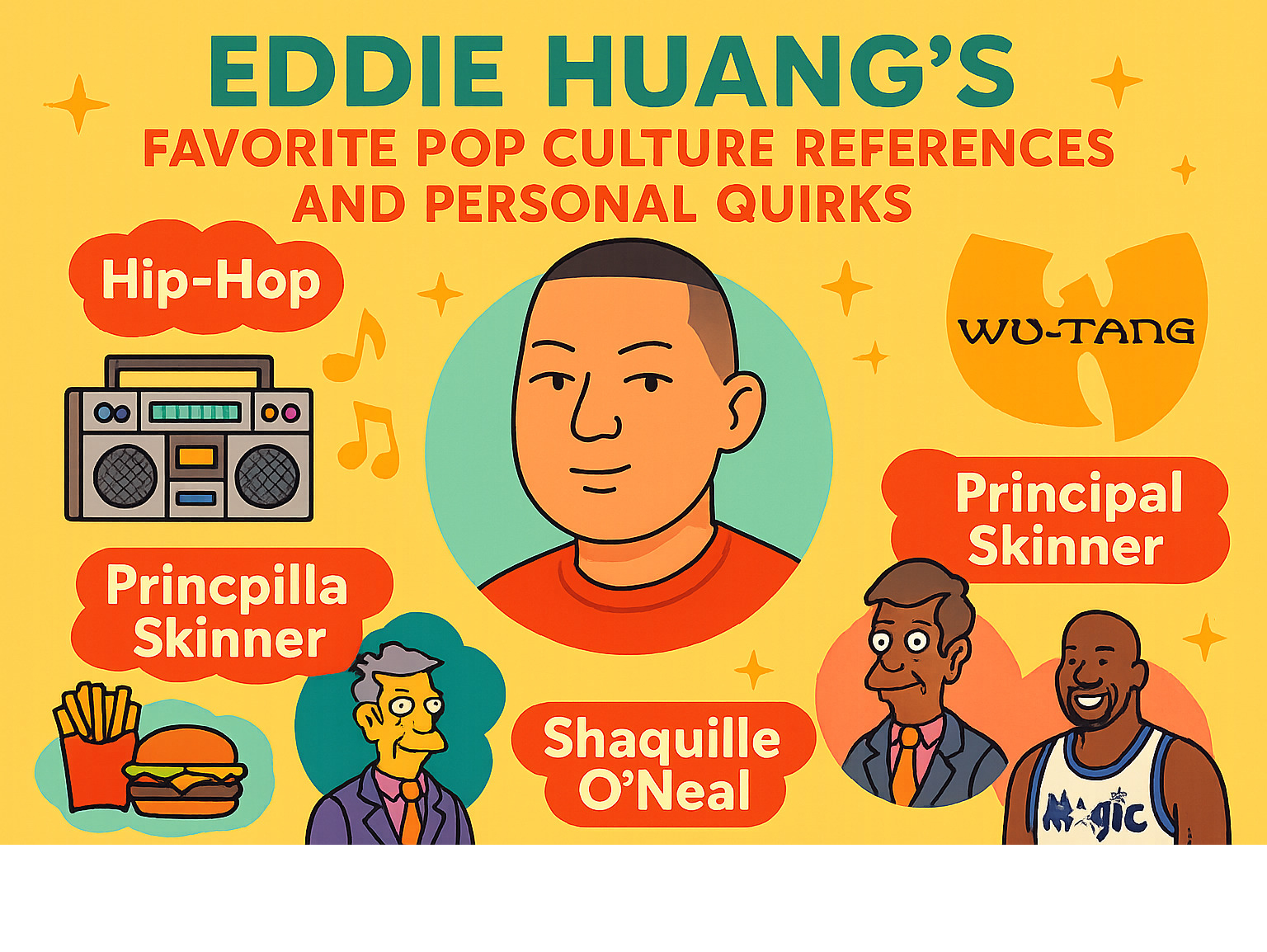
Eddie Huang has always been full of surprises, and his personal quirks reveal just how multifaceted this cultural icon really is. Beyond his public persona as a chef and TV personality, there’s a fascinating collection of details that make him uniquely himself.
His full name is Edwyn Charles Huang, with that middle name “Charles” adding a touch of formality to someone who’s anything but conventional. Despite his tough exterior and street-smart persona, he’s got some unexpectedly endearing habits – like his genuine love for Wendy’s fast food. It’s the kind of authentic detail that shows even cultural critics have their comfort foods.
As a die-hard Orlando Magic fan, he’s stayed loyal to his Florida roots throughout his career. This sports fandom connects back to his childhood fascination with basketball culture, particularly his obsession with Allen Iverson that carried over into his TV character.
One of his more unusual claims involves improved eyesight from eating blueberries. After spending a summer eating them regularly, he noticed better vision and later even opened a blueberry farm. Whether the connection is real or coincidental, it shows his willingness to experiment with food beyond restaurant kitchens.
His career path took some unexpected turns before he became famous. After being laid off from his law job, Eddie Huang worked as a stand-up comedian and even dealt marijuana to make ends meet. This hustle mentality eventually led him to open BaoHaus, proving that sometimes the most unconventional paths lead to success.
His entrepreneurial spirit extended to fashion through Hoodman Clothing, a streetwear label he founded with collaborations featuring graphic designers from Taiwan. This venture combined his interests in style, culture, and business while maintaining connections to his heritage.
The success of his travel show “Huang’s World” earned critical acclaim with an 8.1 rating, showcasing his ability to connect food with storytelling. In 2011, he was named to Chow.com’s annual ‘Chow 13’ list of influential figures in the food industry, recognizing his impact on American dining culture.
Comparing Real Eddie vs. TV Eddie
The differences between the real Eddie Huang and his television counterpart reveal how much gets lost in adaptation. While the real Eddie was born March 1, 1982, the TV version celebrates his birthday as November 10, 1983. More significantly, the real Eddie’s outspoken, controversial personality got softened into a family-friendly, comedic character suitable for network television.
The television version touches on hip-hop culture as a surface-level interest, but for the real Eddie, it’s central to his identity and worldview. Similarly, while TV Eddie deals with typical teen problems in a heartwarming sitcom style, the real Eddie faced serious challenges including racism and identity struggles that shaped his perspective on American culture.
These differences highlight why Eddie Huang became critical of his own show’s adaptation – the sanitized version couldn’t capture the raw authenticity that made his original memoir so compelling for readers seeking genuine cultural experiences.
Frequently Asked Questions about Eddie Huang
Is Eddie Huang still involved with ‘Fresh Off the Boat’?
Eddie Huang had a complicated relationship with the ABC sitcom that made his story famous. He stepped away from day-to-day involvement after the first season, though he remained credited as an executive producer throughout the show’s six-season run.
Initially, Huang served as the show’s narrator, lending his distinctive voice to guide viewers through young Eddie’s trips. However, he quickly became frustrated with how network television transformed his raw, authentic memoir into family-friendly comedy.
The real issue wasn’t the quality of the show – it was the fundamental mismatch between his vision and what ABC needed for primetime television. Huang’s memoir dealt with heavy topics like racism, violence, and cultural alienation that simply couldn’t translate to a sitcom format designed for broad audiences.
He’s been publicly critical of the adaptation, feeling it sanitized his experiences and missed the deeper points about Asian-American identity he wanted to explore. While the show succeeded in bringing Asian-American families to mainstream television, Eddie Huang felt it came at the cost of authentic storytelling.
What inspired Eddie Huang to open BaoHaus?
The path to BaoHaus began with a career crisis that became an opportunity. When Eddie Huang lost his corporate law job during the 2007-08 financial crisis, he could have found another legal position. Instead, he saw a chance to pursue something more meaningful.
His inspiration came from multiple sources. Growing up, he’d worked in his father’s restaurants, learning kitchen operations and developing his palate. He understood both the business side and the cultural significance of food in bringing communities together.
But BaoHaus wasn’t just about serving Taiwanese gua bao – it was about cultural representation. Huang wanted to introduce Americans to authentic Taiwanese flavors without dumbing them down for Western tastes. He refused to make his food “less Asian” to appeal to broader audiences.
The restaurant became his statement about identity and authenticity. Through bold flavors and uncompromising vision, he showed that Asian-American stories could be complex, authentic, and commercially successful. Even though BaoHaus operated on razor-thin margins, it proved that food could be a powerful vehicle for cultural storytelling.
How does hip-hop shape Eddie Huang’s worldview?
Hip-hop culture runs through everything Eddie Huang does, from his business philosophy to his approach to storytelling. As he’s explained, “If you were an outsider, hip-hop was your anthem. And I was definitely the black sheep in my family.”
This connection goes deeper than just musical taste. Hip-hop’s emphasis on authenticity, struggle, and “keeping it real” became the foundation for how he approaches his work. When he insisted on maintaining authentic flavors at BaoHaus, even if it limited his audience, he was applying hip-hop principles to food business.
The culture also influenced his outspoken public persona. Hip-hop artists have always used their platforms to address social issues and challenge mainstream narratives. Similarly, Huang uses his visibility to discuss Asian-American representation, cultural identity, and authenticity in ways that sometimes create controversy.
His identification with hip-hop also reflects his broader understanding of outsider experiences. He saw parallels between his struggles as an Asian-American and the experiences expressed in rap music, finding common ground in stories about overcoming obstacles and staying true to yourself despite pressure to conform.
This worldview shapes everything from his restaurant concept to his filmmaking to his public commentary, making hip-hop culture central to understanding Eddie Huang’s approach to life and work.
Conclusion
Eddie Huang has shown us that the best food stories come from people brave enough to share their real experiences. His path from corporate lawyer to cultural changemaker proves that authenticity resonates more than playing it safe.
Through BaoHaus, his memoir, and his outspoken public voice, Huang opened doors for conversations we desperately needed to have. He didn’t just serve Taiwanese bao buns – he served up honest discussions about identity, representation, and what it means to stay true to yourself in America.
What makes Eddie Huang so compelling isn’t just his cooking or his controversies. It’s his refusal to water down his story for mass appeal. When network television tried to sanitize his experiences, he spoke up. When critics questioned his approach, he doubled down on authenticity.
His influence ripples through today’s food culture in ways both obvious and subtle. The street food boom, the rise of chef-driven narratives, and the growing appetite for culturally authentic dining experiences all bear traces of his pioneering work.
For food lovers seeking genuine culinary trips, Huang’s legacy offers an important lesson: the most memorable meals often come with stories attached. The best chefs don’t just feed your body – they feed your understanding of different cultures and perspectives.
At The Dining Destination, we celebrate innovators like Eddie Huang who understand that great food and great storytelling go hand in hand. His work reminds us why we’re passionate about connecting food enthusiasts with experiences that go deeper than just what’s on the plate.
Whether you’re exploring Taiwanese cuisine for the first time or seeking out the next generation of culturally conscious chefs, remember Huang’s example. Look for the places where food meets story, where tradition meets innovation, and where chefs aren’t afraid to share their authentic selves.
Ready to find your own authentic culinary trips? Explore our chef-led experiences and find dining trips that combine exceptional food with the kind of meaningful storytelling that makes every bite unforgettable.
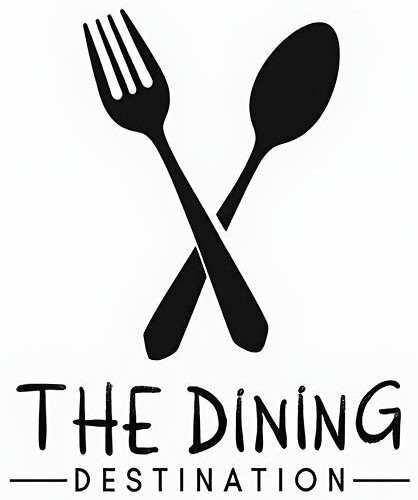
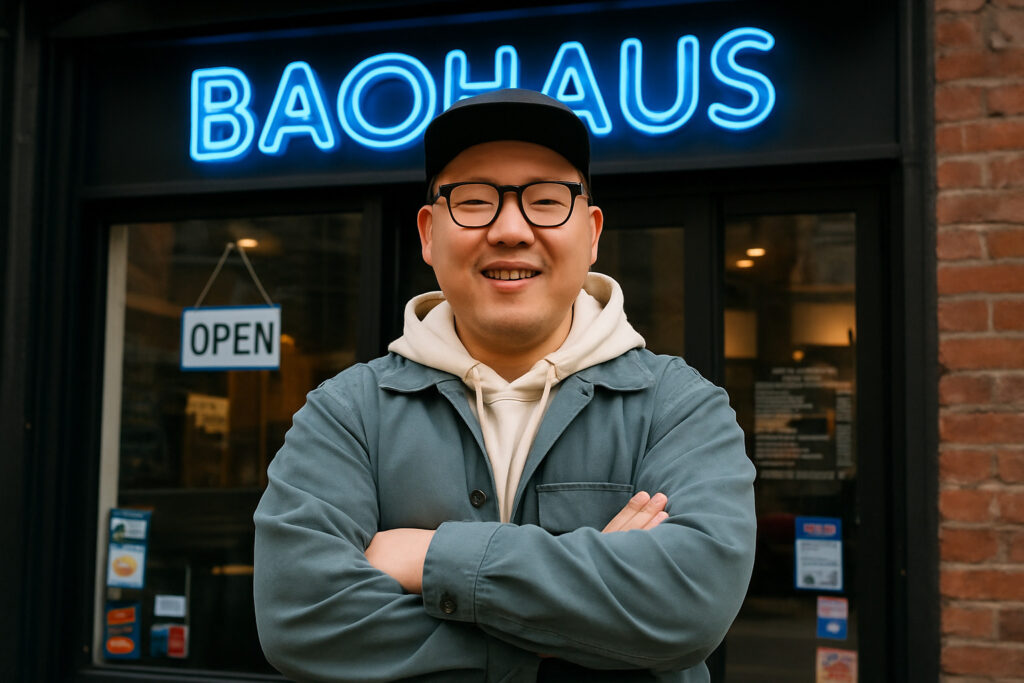






1 thought on “All About Eddie Huang: Chef, Author, and TV Personality”
Pingback: The Complete Guide to Mr Beast’s Net Worth - The Dining Destination
Comments are closed.